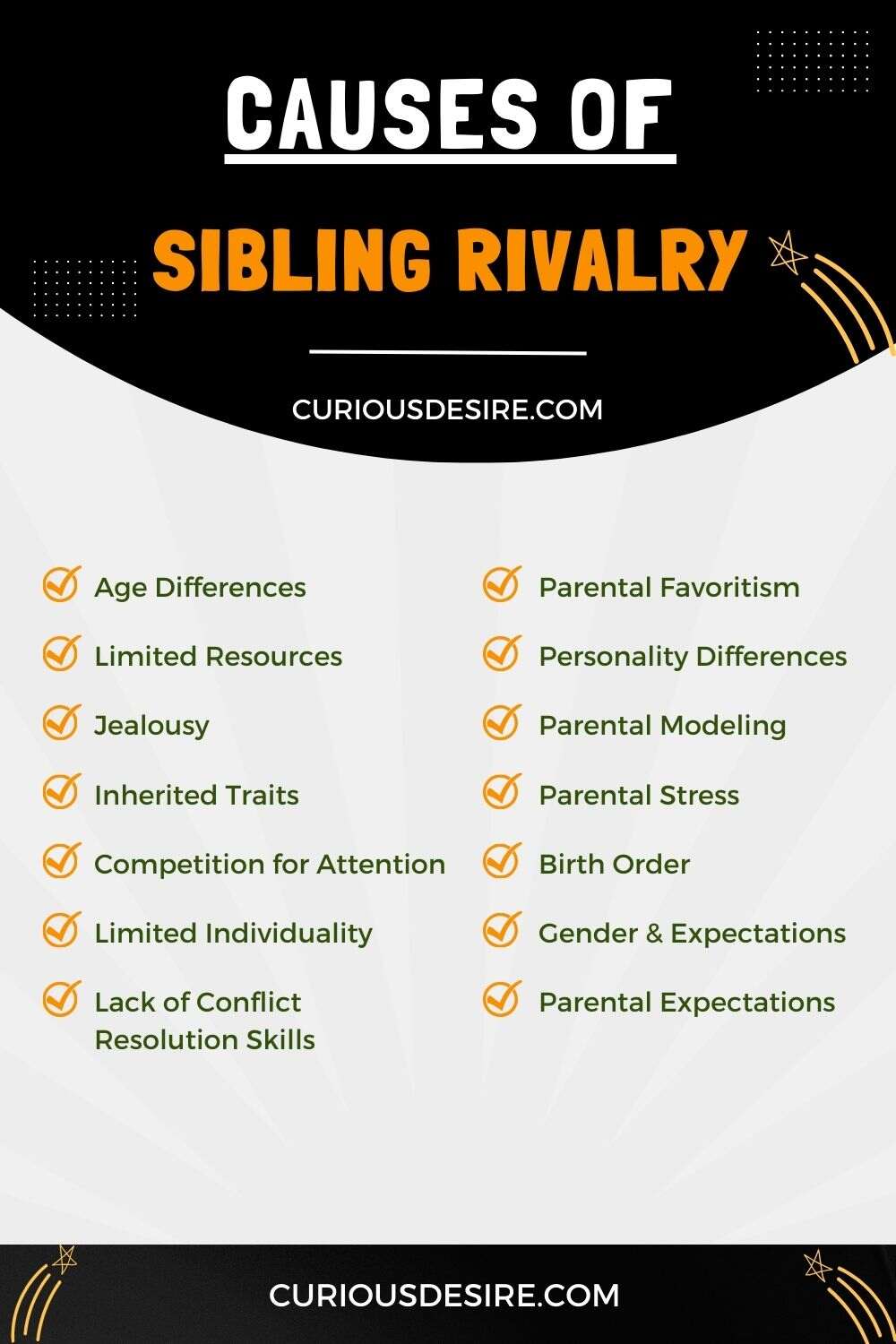Sibling rivalry, a prevalent occurrence embedded in the complex fabric of family dynamics, has captivated psychologists, parents, and observers across generations.
Understanding the intricate factors that contribute to sibling rivalry is pivotal in nurturing an environment where conflicts can be resolved constructively.
While conflicts among siblings are natural, delving into the root causes unveils insights crucial for cultivating healthier family relationships. By identifying these causes, parents and guardians can implement strategies that foster cooperation, communication, and mutual respect among siblings.
In this article, we will unravel the 15 most frequent triggers of sibling rivalry, providing valuable perspectives on addressing these challenges.
This exploration aims to equip families with the knowledge to navigate sibling dynamics effectively, fostering a harmonious atmosphere that promotes positive interactions and lasting connections among siblings.
The 5 Most Common Causes of Sibling Rivalry:
- Age Differences
- Parental Favoritism
- Personality Differences
- Jealousy
- Parental Stress

Cause 1: Age Differences
Sibling relationships encounter hurdles when significant age differences hinder shared interests and activities. Picture an elder sister passionately attending concerts while her younger brother remains immersed in building blocks.
Establishing common ground becomes akin to solving a puzzle in such scenarios. The gap in understanding, fueled by differences in hobbies and preferences, can become a breeding ground for sibling rivalry.
The older sister’s desire for concert experiences clashes with the younger brother’s affinity for constructive play, creating a dynamic where each sibling perceives the other’s interests as alien.
This mismatch in pursuits impedes the formation of shared bonds and sets the stage for potential conflicts and competition between siblings.

Cause 2: Parental Favoritism
Occasionally, parents unintentionally exhibit differential treatment towards their children, resembling favoritism. This dynamic is comparable to having a cherished toy – if one sibling feels overlooked or less valued, it can evoke sentiments of rivalry and bitterness.
If a mother consistently commends one sister for academic success while seldom recognizing the achievements of the other sibling – this scenario becomes the fertile ground for the inception of sibling rivalry.
In such instances, the perception of unequal appreciation or acknowledgment can sow the seeds of competition and discord between siblings, leading to sibling rivalry within the family dynamic. begin to take root.
Source: TEDx Talks
Cause 3: Limited Resources
Suppose there is a home with a single game console, constrained time, and a compact living room area. Siblings could easily end up in a competitive struggle for attention, toys, or even personal space.
It’s reminiscent of a race, each sibling striving to claim the best spot on the couch or be the first to seize control of the highly sought-after game console. The limited resources act as a catalyst, turning the familial environment into a battleground where siblings contend for their rightful share.
In this scenario, the inherent scarcity magnifies the intensity of their rivalry, amplifying the everyday interactions and turning them into contested events within the confines of their shared living space.
The struggle for resources not only shapes the dynamics between siblings but also influences the overall atmosphere of the home, contributing to a sense of competition that permeates various aspects of their daily lives.
Cause 4: Personality Differences
Siblings, much like friends, can possess unique and distinct personalities. When one brother thrives on outgoing and social activities, while the other finds solace in reserved moments and solitude, the potential for conflicts emerges.
Picture the challenge of organizing a family movie night – one sibling is drawn to the thrill of action films, while the other leans towards the light-heartedness of comedies. These divergent communication styles and preferences serve as fertile ground for the growth of sibling rivalry.
The clash between extroversion and introversion, coupled with differing entertainment choices, creates a dynamic where understanding and compromise become essential. As each sibling seeks to assert their preferences, the potential for misunderstandings and disagreements increases.
Navigating the intricacies of such personality differences requires a delicate balance and open communication within the family unit, ensuring that siblings can respect each other’s individuality.
Cause 5: Jealousy
Experiencing a twinge of envy when your sibling obtains something you long for, like a new phone or additional attention, is a relatable emotion. Sibling jealousy, a sincere sentiment, tends to surface when a sister excels academically or when a brother enjoys a thriving social circle.
The achievements and perceived advantages of one sibling have the potential to stir feelings of envy in the other, sparking the flames of rivalry.
The resulting rivalry may manifest as a natural response to the perceived imbalance in the distribution of attention creating a dynamic where siblings vie for acknowledgment and recognition within the family unit.
This emotional response is a common facet of sibling relationships, highlighting the complexities inherent in navigating the nuanced dynamics of familial interactions.

Cause 6: Parental Modeling
Children naturally mimic the actions of their parents, absorbing and replicating their behaviors. When parents display occasional rivalry or disagreements, it serves as a blueprint for their children to emulate.
Unintentionally, these youngsters may adopt such behaviors, perceiving them as a standard mode of interaction. Inadvertently, parents, acting as influential role models, unknowingly contribute to laying the foundation for the emergence of sibling rivalry.
The subtle cues and patterns set by parental conduct create a framework within which siblings learn to navigate relationships, sometimes mirroring the discord they witness.
Recognizing the profound influence parents wield in shaping the behavioral landscape of their children highlights the need for conscious and positive modeling, fostering an environment where siblings can learn constructive ways of relating to one another.
Cause 7: Inherited Traits
Behavioral patterns and actions are occasionally inherited from our parents through genetic transmission. Siblings, influenced by these inherited traits, often exhibit distinct approaches to various aspects of life.
This divergence in behavior can pave the way for disagreements and competition among siblings. Imagine one sibling inheriting a predisposition for meticulous planning, while another embraces spontaneity due to familial genetic influences.
These differing traits can manifest in how they approach tasks, make decisions, and navigate everyday challenges. Consequently, clashes may arise as each sibling interprets situations based on their inherited tendencies, fostering arguments and a sense of competition within the familial dynamic.
The interplay of inherited traits becomes a significant factor in shaping the unique perspectives and behaviors that contribute to sibling dynamics.
Cause 8: Parental Stress
When parents grapple with high levels of stress or engage in constant arguments, a palpable tension disturbs the home environment. This heightened atmosphere of strain can significantly increase the likelihood of sibling conflicts.
The children, exposed to this stress, may find themselves unequipped to navigate the overwhelming tension. In such circumstances, their natural response might be to release their stress and frustrations onto their siblings, inadvertently translating the home’s tense ambiance into discord among siblings.
The lack of coping mechanisms and emotional tools can amplify sibling rivalry, as they struggle to comprehend and manage the stress permeating their shared space, resulting in heightened conflicts and discord within the familial setting.
Cause 9: Competition for Attention
In families with numerous children or where parental schedules are consistently hectic, siblings may rival their parent’s attention. The intense competition for scarce time and focus can breed jealousy and discord among siblings.
Imagine a scenario where parents, juggling multiple responsibilities, struggle to allocate equal time to each child. In this environment, siblings may vie for recognition, affection, and shared moments with their parents.
This competition, fueled by a desire for acknowledgment and connection, can lead to disagreements and heightened tensions among siblings. The inherent need for parental attention becomes a catalyst for interpersonal conflicts, highlighting the importance of fostering a balanced family dynamic.
Cause 10: Birth Order
Your position in the sibling lineup significantly influences self-perception and how others perceive you. Birth order plays a pivotal role in shaping personality and behavior, consequently impacting sibling dynamics.
The eldest child, often shouldering responsibilities, tends to develop leadership qualities, while the middle child may adopt peacemaker traits, striving for harmony. Youngest siblings, accustomed to seeking attention, may embrace a more carefree attitude.
These inherent characteristics can shape how siblings interact, leading to distinctive relationships. Understanding these birth-order dynamics allows for greater insight into the nuances of sibling connections, fostering empathy and promoting healthier interactions among brothers and sisters.
Cause 11: Limited Individuality
At times, siblings sense a need to distinguish themselves significantly from one another to garner attention and stand out within the family dynamics. This yearning for individuality often triggers a subtle yet impactful sense of competition, wherein each sibling strives to carve out a distinct identity.
The inherent drive to be unique prompts varied pursuits and expressions of individuality, fostering an environment where siblings compete for recognition.
This quest for distinctiveness can lead to subtle rivalries as each sibling endeavors to showcase their unique qualities, preferences, or achievements, inadvertently creating a dynamic where individuality becomes a catalyst for sibling competition.
Cause 12: Gender Roles and Expectations
Society frequently imposes expectations based on gender, influencing parental treatment of children and fostering potential sibling rivalry. Traditional gender norms may lead parents to inadvertently favor one gender over another, creating a perception of unequal treatment among siblings.
For instance, if societal expectations dictate that boys should be tough and girls should be nurturing, parents might unconsciously reinforce these stereotypes in their interactions.

This differential treatment can instigate feelings of rivalry between siblings who sense they are not receiving equal attention or opportunities.
The impact of gender-based expectations on family dynamics highlights the need for conscious efforts to treat each child individually, fostering an environment where siblings can flourish without succumbing to rivalry spurred by societal norms.
Cause 13: Lack of Conflict Resolution Skills
When siblings cannot resolve problems or conflicts amicably, minor disagreements have the potential to escalate into enduring rivalries. The absence of effective communication and conflict resolution skills exacerbates the strain on their relationship.
In essence, the inability to engage in constructive dialogue hinders the reconciliation of differences, allowing resentment and animosity to linger. This dearth of problem-solving skills not only perpetuates ongoing discord but also creates a negative pattern in the sibling dynamic.
Without the capacity to navigate disputes peacefully, siblings may find themselves trapped in a cycle of unresolved issues, further intensifying the strain on their relationship and impeding the development of a more harmonious bond.

Cause 14: Parental Expectations
Parents often harbor high or unrealistic expectations for their children, inadvertently fostering a competitive atmosphere between siblings. The weight of these expectations catalyzes rivalry as each sibling endeavors to meet or surpass them.
The pressure to excel in academics, sports, or other pursuits intensifies the competition, leading to strained relationships and a constant sense of comparison. In this environment, siblings may feel compelled to outshine one another, inadvertently sowing the seeds of rivalry.
The quest to fulfill parental expectations transforms the family dynamic into an arena of competition, where success in one area becomes a benchmark for comparison, potentially overshadowing each sibling’s strengths and efforts.
Cause 15: Communication Breakdown
Effective communication is a vital component of sibling relationships. When communication falters, misunderstandings can arise, giving way to unresolved issues and conflicts. Siblings must engage in open dialogue, expressing their thoughts and emotions to prevent breakdowns in communication.
The act of sharing feelings fosters mutual understanding and helps address concerns promptly, reducing the likelihood of escalating conflicts.
Encouraging siblings to talk openly creates a supportive environment where concerns are acknowledged and resolved, strengthening the bond between them. In essence, prioritizing good communication ensures that siblings navigate their relationships with clarity and empathy, fortifying the foundation of their connection.
Effective Solutions to Sibling Rivalry
Communication Is Key: Encourage open dialogue among siblings to express feelings, concerns, and viewpoints.
Fair Treatment: Ensure fairness in parental attention, praise, and discipline to avoid feelings of favoritism.
Shared Activities: Foster common interests and shared activities to create bonding opportunities.
Conflict Resolution Skills: Teach siblings constructive ways to resolve conflicts, emphasizing compromise and understanding.
Quality Family Time: Allocate dedicated family time to strengthen the overall family bond and reduce rivalry.
Positive Reinforcement: Acknowledge and reward positive behaviors between siblings to promote a supportive environment.
Individual Recognition: Recognize and celebrate each child’s unique achievements and qualities.
Establish Boundaries: Set clear boundaries to define personal space and belongings, minimizing potential disputes.
Parental Involvement: Stay actively involved in your children’s lives, addressing concerns and guiding them through challenges.
Model Positive Behavior: Demonstrate healthy communication and conflict resolution skills as parents.
Conclusion
When dealing with problems between brothers and sisters, the first thing to do is figure out why it’s happening. Knowing why fights and disagreements happen helps make family relationships better.
Parents and people who take care of kids can then use ways to encourage working together, talking nicely, and respecting each other among siblings. Figuring out and dealing with the main reasons for fights can make family bonds stronger and more peaceful.
To understand these reasons, it’s important to see how each one can make fights between siblings happen. When everyone in the family, including parents and brothers or sisters, understands these things, they can team up to make the family a kinder and more supportive place.
This helps build good relationships that can stay strong forever.
FAQs – Causes of Sibling Rivalry
1. Is sibling rivalry normal?
Yes, sibling rivalry is a common aspect of family dynamics, influenced by various factors.
2. How can parents mitigate sibling rivalry?
Parents can foster open communication, treat each child fairly, and encourage collaborative activities.
3. Does birth order play a significant role in sibling rivalry?
Birth order can influence personality development, impacting how siblings interact.
4. Can sibling rivalry be outgrown?
With effective communication and conflict-resolution skills, siblings can develop healthier relationships over time.
5. Are there cultural differences in how sibling rivalry manifests?
Yes, cultural influences can shape the dynamics of sibling relationships, contributing to rivalry in different ways.